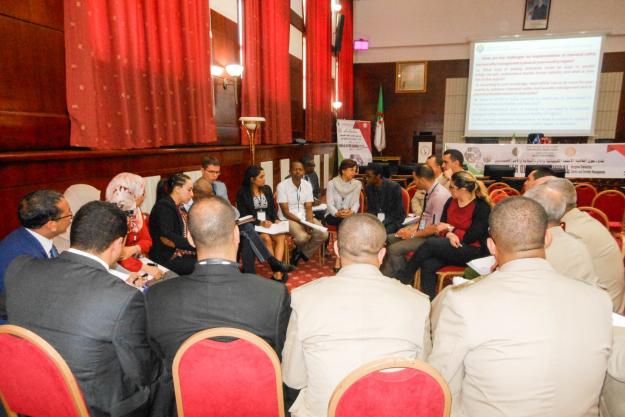
Participants at an OPCW Chemical Safety and Security Management Course for Chemical Industry in Algiers, Algeria
THE HAGUE, Netherlands — 6 June 2017 — Chemistry professionals from across Africa are better equipped to implement the industry-related provisions of the Chemical Weapons Convention (CWC) after a workshop on chemical safety and security management for chemical industry conducted by the Organisation for the Prohibition of Chemical Weapons (OPCW) in Algiers, Algeria from 15 to 17 May 2017.
The workshop presented a step-by-step guide on how to set up and manage an effective safety and security framework in a chemical plant for small-and medium-sized enterprises. “Learning how to reduce and eliminate the safety and security risks at chemical plants is essential for preventing chemical accidents and the potential misuse of chemicals,” said OPCW’s Senior International Cooperation Officer, Mr Rohan Perera.
H.E. Major General Djamel Gueroui, a special guest representing Algeria’s Ministry of Defence, underlined in his opening remarks the important role capacity-building has played over the twenty years of the OPCW’s existence. He expressed, ”OPCW’s accomplishments are the result of a global endeavour involving nations, chemical industry, scientist and civil society, to create and enforce the world’s most successful international disarmament treaty”.
Ambassador of Algeria to the Kingdom of the Netherlands and Permanent Representative to the OPCW, H.E. Mr Nourredine Ayadi, stressed Algeria’s contributions to implementing the Chemical Weapons Convention as a testament to Algeria’s “visible and practical expression of commitment to multilateralism”. He stated, “As a member of the OPCW Executive Council since the Organisation’s creation, Algeria has worked for the rigorous application of the Convention and vigorously campaigned to advance the interests of the African Continent within the OPCW”.
The 54 attendees represented 13 OPCW Member States and were a diverse group ranging from government officials responsible for chemical industries and small- to medium-sized chemical industry professionals, to academics and chemists.
The workshop’s programme included briefings on various African countries’ experiences in safety management in chemical industries. Topics discussed included: industry outreach, chemical safety and security risk assessment for accident prevention and preparedness, Responsible Care for the Africa Region, and chemical threat mitigation strategies. Expert speakers comprised specialists from Sandia National Laboratory, Algerian National Authority, Ugandan National Authority, and the OPCW.
Following the workshop, on 14 of May, a special event was held to mark the 20th anniversary of the Chemical Weapons Convention and the OPCW. It was attended by the representatives of Algeria’s Ministry of Defence, Ministry of Foreign Affairs, and other guests. The event featured speeches from the Major General Djamel Gueroui, H.E. Mr Nourredine Ayadi, and OPCW representative, Mr Rohan Perera.
Background
As the implementing body for the Chemical Weapons Convention, the OPCW oversees the global endeavour to permanently and verifiably eliminate chemical weapons. Since the Convention’s entry into force in 1997 – and with its 192 States Parties – it is the most successful disarmament treaty eliminating an entire class of weapons of mass destruction.
To date, nearly 95 per cent of all chemical weapon stockpiles declared by possessor States have been destroyed under OPCW verification. For its extensive efforts in eliminating chemical weapons, the OPCW received the 2013 Nobel Prize for Peace.
